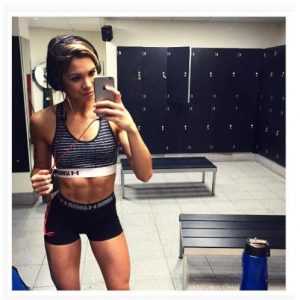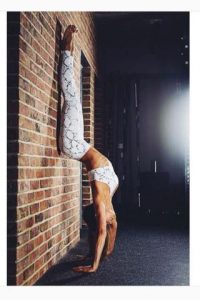Dr Hazel Wallace works 12-hour shifts at University College Hospital and still finds time to be Instagram’s latest health queen
I feel for Deliciously Ella and Natasha Corrett. Just as they think it can’t get any worse after a BBC documentary rains on their clean-eating parade by calling into question the science behind their diet empires, suddenly they find there’s a new kid on the block and she is stealing their limelight.
There she is, on her Instagram feed, looking like a cross between Nicole Scherzinger and Mylene Klass as she does yoga press-ups in her Sweaty Betty gym kit or pedals through Hyde Park in a jogging bra and jeggings. She’s just hosted an “alternative Christmas” supperclub in Belgravia, central London, where guests dined on aubergine sliders, quinoa and chestnuts, so no wonder she’s “pressing pause” on her hectic lifestyle to prepare a green-tea face mask, her top slid coquettishly off one shoulder to reveal the merest hint of cleavage. Pictures of breakfast bowls of protein zoats (that’s porridge and courgettes to you and me) or chilli with butternut squash noodles attract squeals of delight from her adoring fans.
People have started to see food in terms of fear
So far, so “look at me and my perfect life”, you might think. But 26-year-old Hazel Wallace is no posh wannabe, she wasn’t born with a silver spoon that she now uses to feed her celeb friends. Instead, she is a trainee doctor with a further degree in medical science who is working nights in a distinctly unglamorous department of University College Hospital in central London. Her credentials suggest she should be taken more seriously.
Yes, she may advocate the occasional fashionable plate of “superhero bircher muesli” and salads of hand-massaged kale, but the bulk of the food she posts on her Food Medic blog — plates of supermarket chicken with roasted aubergine and quinoa, perhaps, or broccoli, tomatoes and mushrooms with smoked salmon and a poached egg — looks endearingly unstyled, the kind of thing that a health-conscious and nutritionally aware twentysomething with a demanding job might put together.
“My philosophy is everything in moderation,” she tells me after 11 consecutive nights on duty. “I love eating wholefoods, fresh fruit, vegetables and meat, but on the flipside I’m not the type of person who will say no to wine or chocolate even if it’s full of refined sugar and transfats. What I promote is balance.”
It comes down to combining an active lifestyle with making sure that all the food groups are represented on your plate, she says, and having the confidence to make your own healthy choices. “Choose a good-quality protein, whether you’re a veggie or you eat meat, add two cupped handfuls of vegetables, preferably two types to get a broad spectrum of nutrients. Add a fistful of good carbohydrates, be it rice, grains or potatoes, whatever, then accessorise with some fats, such as avocado, olive oil, nuts or seeds. And that’s the template. It’s really not very complicated but it is very versatile and can be applied to breakfast, lunch or dinner.” It makes her come across as a less hairy version of Joe Wicks, the fitness coach who has made millions from promoting a combination of exercise and a commonsense diet.

Her Instagram feed has led to sponsorship from Sweaty Betty and Origins
It’s a message that has clearly struck a chord. After amassing 110,000 followers on Instagram since 2013, she’s attracted the attention of sponsors such as Sweaty Betty and the cosmetic brand Origins, as well as the publisher Yellow Kite. The Food Medic, Recipes for Life and Fitness comes out in May.
“I like to think of myself as one of the first of a new generation of doctors,” she says, one who can expose the myths surrounding the diet industry. “There are so many exclusive diets out there and people have started to see food in terms of fear. The biggest myth is around gluten. Can I have carbohydrates after 6pm? Will fat make me fat? All these messages are flying around and causing confusion. It needs to be stripped back and brought back to basics so people can make their own judgments.”
Wallace says it’s her analytical mind that enables her better to distinguish fact from fiction. “The biggest thing about having a medical background is it allows me to critically analyse papers. There’s so much online at the moment and you need to know how to pick out the good evidence from the bad.”

Wallace has amassed 110,000 followers on Instagram since 2013
She was brought up in Dundalk, in Ireland, with her two older sisters. She had always been sporty, but lost interest when her father died of a stroke when she was 15. This provided her with the impetus to study medicine, so after a three-year undergraduate course in medical sciences she went on to study at Cardiff medical school. It was during this time she set up her blog. “It was a private account at first. I just wanted to use it as a diary to make myself more accountable about what I was eating. When I was a student, food was basically just something to give me energy, so it was all sugary and fatty. Then in the final year I realised I was carrying a lot more weight, my skin didn’t look good and I was very lethargic.”
She started to think more carefully about what she was eating and to cook from scratch, and to write about it. Her audience rapidly grew. “I think a lot of people with full-time jobs look at me and think, ‘If this girl can do it, I can too.’ ”
She certainly comes across as highly disciplined, finding time to blog most days and to go to the gym three times a week. “I think most medics are. You have to be to do the degree in the first place,” she says. She lives with a flatmate but cooks just for herself. “I find it therapeutic, so I don’t mind coming back from a busy shift and cooking. Typically I’ll make something like chicken breast with vegetables and quinoa, rice or sweet potatoes. I tend to bulk out my meals with lots of vegetables.

Wallace blogs most days and goes to the gym three times a week
After the Horizon documentary exposed the dodgy science behind much of the clean-eating movement, Wallace has, like Deliciously Ella, been quick to distance herself from the term. “I think my first interpretation of clean eating was that it was cleaning up your diet and getting rid of the rubbish, but now it’s become this whole thing, it’s been taken too far. The words we use to describe food are much more important than we realise. Attaching ‘clean’ and ‘guilt-free’ to certain foods implies that other foods and those who eat them are unhealthy. That’s one problem. The other is that people [risk] cutting out important food groups and depriving themselves of certain nutrients.
“We are all genetically different so we have different intolerances and enjoy different foods. There is no one size that fits all, and that’s true of everything in life. That’s why we need to understand the basics of nutrition so we can design our own diets to suit ourselves.”
It all sounds eminently sensible but I’m not convinced there is as much clear water as she would like to think between her and the clean-eating bandwagon. Her recipes make liberal use of such fashionable ingredients as almond milk, agave syrup, coconut oil, grated cauliflower and even pink Himalayan salt, for which she makes only a half-hearted nutritional claim. Yet she says that she is going to focus on her medical career from now on, and hopes to become a GP. And if she persuades more people to have a balanced diet along the way, all power to her.

